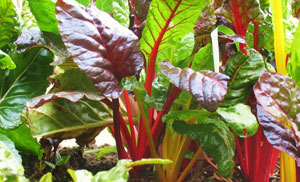It's summer! Around us, gardens dazzle in full bloom. Are there garden flavors and sights you've enjoyed this summer? The sweet raspberries stand out for me. Would you agree that whether you tend a garden or are the recipient of its delicious gifts life is better during the growing season? Food and flowers offer gardeners ample reward but, in fact, gardens contribute a much wider range of benefits to personal well being and to our community. Though still and lovely gardens give actively to our quality of life.
Gardens enhance neighborhood health. Neighborhood gardens, particularly, pea patches and community gardens, have been shown to stabilize and improve property values and reduce crime. They also support the local ecosystem by filtering rainwater which helps to keep nearby lakes and rivers clean. Take a deep breath in the garden and you'll notice fragrance but did you know that the air you're breathing is purer because of the oxygen exchange quietly happening around you? For all their passive beauty gardens are constantly regenerating and improving the places we live.
 Gardens guard us against modern problems such as stress and mental illness. A recent European study showed that gardening helped with mood and relaxation even more than reading or more common ways we wind down. "There's growing evidence that doing something like working in the garden has therapeutic benefits," Dr Charles Raison told Arizona Public Media earlier this year. "....There's not alot of data because it's fairly new...but there are now a number of studies to suggest that gardening, and in particular therapeutic gardens, may beneficially impact a range of conditions: obesity, schizophrenia, dementia and depression," Raison said. He cited the well documented healing power of nature, the whole body involvement of gardening, and the immune benefits of soil interaction as main reasons for such positive health benefits.
Gardens guard us against modern problems such as stress and mental illness. A recent European study showed that gardening helped with mood and relaxation even more than reading or more common ways we wind down. "There's growing evidence that doing something like working in the garden has therapeutic benefits," Dr Charles Raison told Arizona Public Media earlier this year. "....There's not alot of data because it's fairly new...but there are now a number of studies to suggest that gardening, and in particular therapeutic gardens, may beneficially impact a range of conditions: obesity, schizophrenia, dementia and depression," Raison said. He cited the well documented healing power of nature, the whole body involvement of gardening, and the immune benefits of soil interaction as main reasons for such positive health benefits.
Other forms of exercise may require strong physical health but gardening can be done sitting down. You're never too old to garden! Gardeners? Would you agree? Low impact garden exercises cultivate strength and flexibility. They help to lower blood pressure and enable us to recover quicker from illness. Gardening preserves strong motor skills, burns calories, and improves outlook. The miracle of watching a dot sized seed become a flower or the assurance that shoots will thrust through soil year after year can also heal the soul as poet Barbara Crooker shows her readers in The White Poems, a collection of poetic musings written after the death of her friend Judy Krol.
Gardens are healing and rewarding. They give more than they take and they'll take any level of investment you can give---a few containers on your porch or a full fledged vegetable and flower garden. For less than 50$ they offer help with stress, stimulate the immune system, provide good exercise, guard against dementia and depression, yield ample food that you know you can trust, generate cut flowers to enjoy inside, promote a healthier local ecosystem, motivate a more nourishing diet and, if you practice community gardening, offer social support and inter-generational exchange.
Gardening isn't for everyone but it touches all of our lives with wide benefits to our health and our neighborhoods. If you're a gardener your efforts extend beyond the land you cultivate. If you've never gardened...why not try it? A package of seeds costs less than $2.00. There are few other ways to get so much return on a modest investment of time and money and no other way to experience the delight of growing your own delicious foods and beautiful flowers.
Update 30 Oct 13...Check out this article published in the BBC News reports findings from a 12 year study in Stockholm which found that "Being active reduced the risk of a heart attack or stroke by 27%, and death from any cause by 30%, during the 12-year study."
Update 14 July 2015...A new study finds: “having 10 more trees in a city block, on average, improves health perception in ways comparable to an increase in annual personal income of $10,000..."

